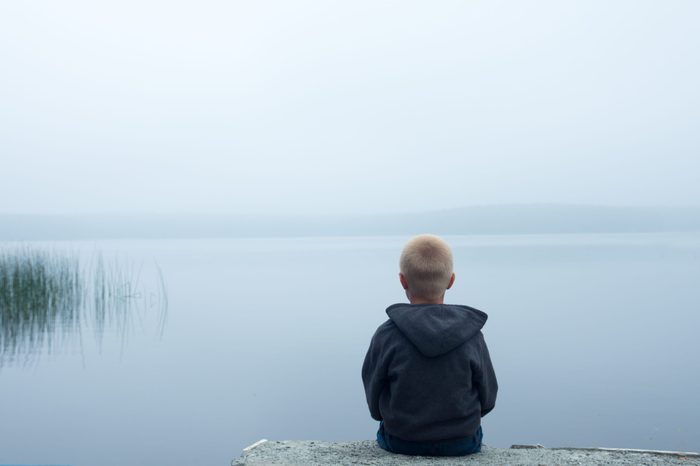
Making sure a preschooler in isolation doesn’t feel isolated
Quinn Waters has seen a lot of tough things in his short three years of life. So when the preschooler was put in isolation in his home as part of his treatment for brain cancer, his family prepared themselves to help him endure one more heartbreaking hardship. But then the Waters’ neighbors stepped in, deciding that while they couldn’t do anything about the cancer, they could certainly keep Quinn entertained. At first, it was just nearby friends doing silly puppet shows, juggling, singing, and playing games outside the large window where the little boy watched, delighted. As word spread, however, more and more people showed up—from the community and then from around the country. Quinn, nicknamed “The Mighty Quinn,” and his family have now been visited by athletes, police departments, dance teams, and he even got his own private concert from the Dropkick Murphys, all from his “quindow.” “The fact that there’s so much bad news, you see something like this and everybody wants to get on board with it. No one wants to see a little kid be sick,” his father Jarlath Waters told Fox26. “Every single person who has shown up has done wonders for him.”
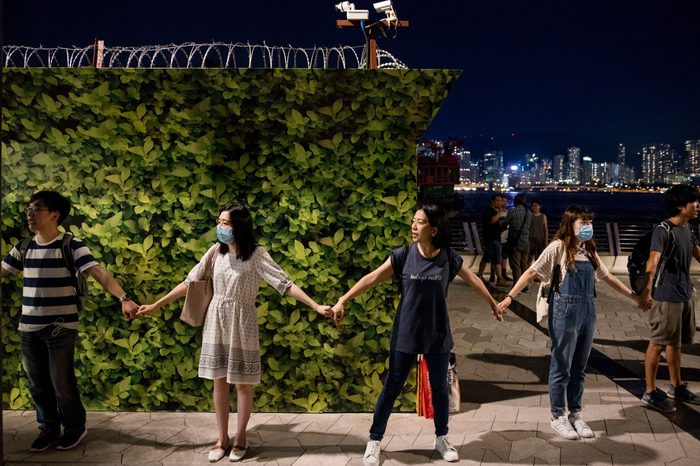
Standing together for democracy
Neighbors certainly help each other in many small ways every day but sometimes we’re reminded of just how powerful neighbors can be, especially when they band together. On August 23, 2019, in Hong Kong, over 10,000 people came out of their homes and stood, quietly holding hands with their neighbors. The massive human chain, that covered more than 35 miles, was a show of solidarity with the people who have been protesting for freedom and democracy for months. But it’s not just a political protest, it’s also a symbol of the power of community, Willy Lam, adjunct professor at the Center for China Studies at the Chinese University of Hong Kong, said to the New York Times. “They have chosen this human chain as a symbol of unity,” he said. For more political inspiration, read up on these 12 protests that changed the world.
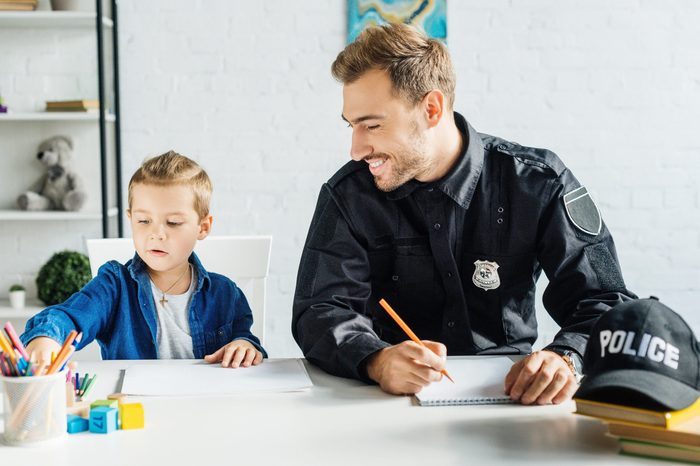
When “to serve and protect” also means “to feed and wash dishes”
When officers Stan and Jeroen, of Eindhoven, Netherlands, were called to a local woman’s house they expected to find her in distress and help her. What they didn’t expect to find were five young, hungry children who had just watched their mother get taken away by ambulance. As they waited for relatives to arrive, the officers decided to do the neighborly thing and care for the kids. They made fried egg sandwiches with fruit for dinner and then did the dishes and tidied up the kitchen. “Together we are stronger!” they wrote in a comment they posted, along with a picture, to their community Facebook page. What a beautiful reminder that police are public servants and neighbors just as much as they are law enforcers. Here are 45 other things police officers want you to know.
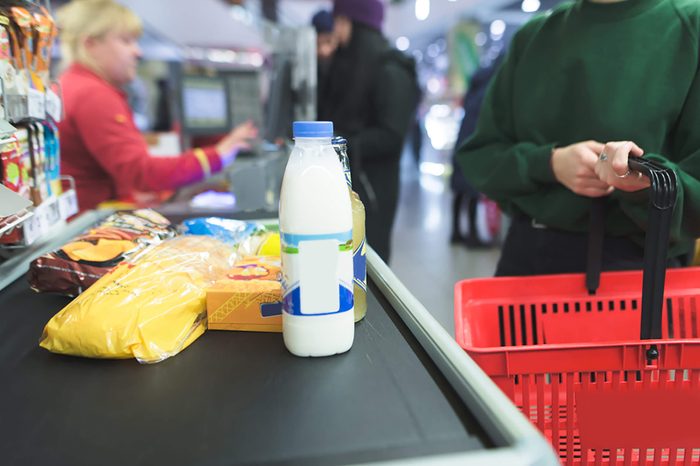
Paying for groceries isn’t just about the money
There’s been a trend recently of stories of people buying their neighbor’s groceries when the neighbor couldn’t afford them. It’s a refreshing thing to hear in a day when clever and widespread scams are making neighbors distrust each other more than ever. One anonymous viral story reads, “I was in line at Aldi and this girl with two toddlers in front of me had her card declined and she looked so sad and said ‘let me call my husband real quick’ and it was only $18, so I just paid for it, and she was very sweet and then as she walked off, the lady behind me said ‘You know that was probably a scam, right’ and like, even if it was, like what a sad scam, right? $18 at the Aldi. If you’re ‘scamming’ me for some Tyson chicken and apple juice and cauliflower, then just take my money.” Ashley Westover was so moved by this story and dozens like it that she posted a compilation to her Facebook with the reminder to “Do good recklessly!” As shown in the hundreds of comments, the stories have since motivated many others to pay for their neighbor’s groceries. Can’t afford to buy your own groceries, much less your neighbor’s? Do one of these 50 random acts of kindness that don’t cost a cent.
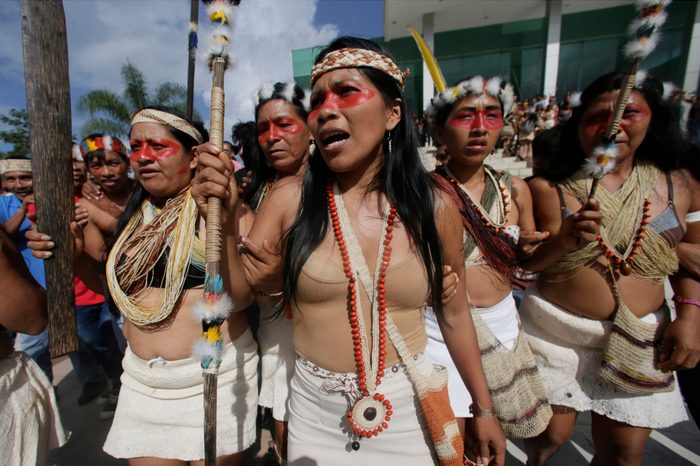
Banding together to keep their homes—and ours—safe
You’ve probably never heard of the Waorani, an indigenous nation in a remote part of the Ecuadorian Amazon. It’s probably safe to say that even the Ecuadorians didn’t give them much thought—as shown by the government’s decision to sell their ancestral lands for oil exploration. But the native neighbors were not going to lose their homes without a fight. Traveling by canoe and small plane, hundreds of Waorani men and women showed up to protest the move and filing a lawsuit against the government. It worked and the tiny neighborhood saved 7 million acres of rainforest, helping not just their immediate neighbors but all their neighbors on this planet who depend on the Amazon for fresh air. “Our territory is our decision, and now, since we are owners, we are not going to let oil enter and destroy our natural surroundings and kill our culture,” Nemonte Nenquimo, a Waorani leader, told the New Yorker. Here’s what would happen if the rain forest disappeared.
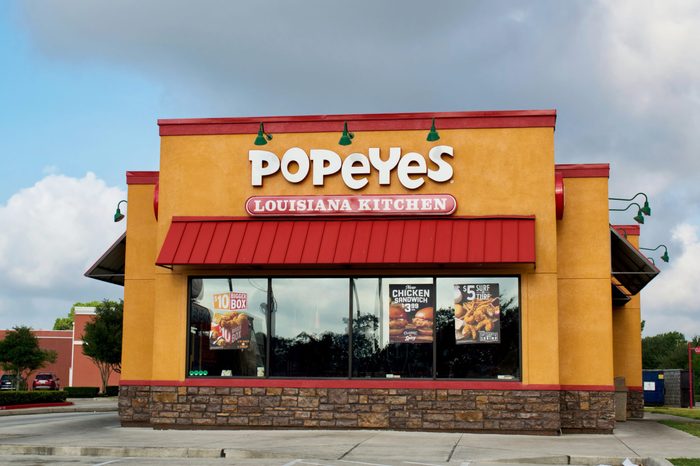
From chicken sandwiches to the ballot box
In the epic battle of fast-food chicken sandwiches, it appears Popeyes has won the war. People are raving about the fried chicken breast on a brioche bun with pickles and spicy mayo, often waiting hours to buy one. “I decided to register people to vote after I saw there was a lack of young people politically involved,” David Ledbetter, 17, told CNN. “I believe that it is our duty to vote as American citizens and it would be wrong not to exercise our political voice.” He added that he likes engaging with his neighbors in the community and has aspirations to help people and make society better as a whole.
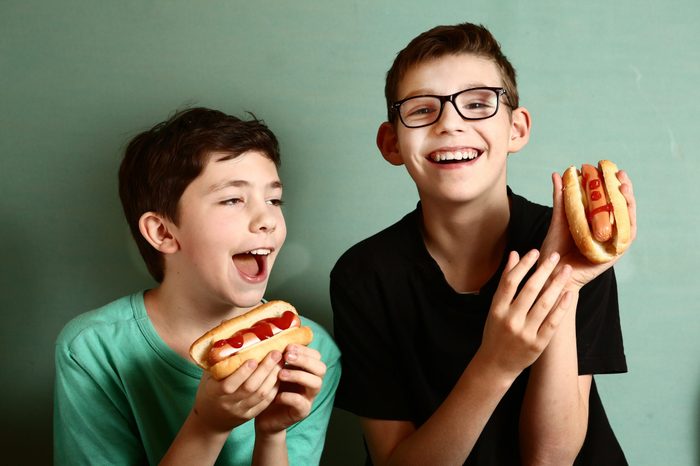
Handing out hot dogs and hope
Natural disasters have a way of making people depend on their neighbors in a way nothing else does and the results can be incredibly moving—as six-year-old Jermaine Bell proves. The boy had been saving money with his family for a dream trip to Disneyworld when their neighborhood was suddenly ordered to evacuate before Hurricane Dorian hit the South Carolina town. Immediately the first-grader decided that he’d rather use his hard-earned cash to help his neighbors fleeing the storm than for a vacation. Jermaine stood alongside a nearby road handing out hundreds of chips, hot dogs, and bottles of water to evacuees. He even stopped to pray with neighbors who were scared or worried. “I wanted them to have some food to eat, so they can enjoy the ride to the place that they’re going to stay at,” he told WJBF. “I wanted to be generous and live to give.”
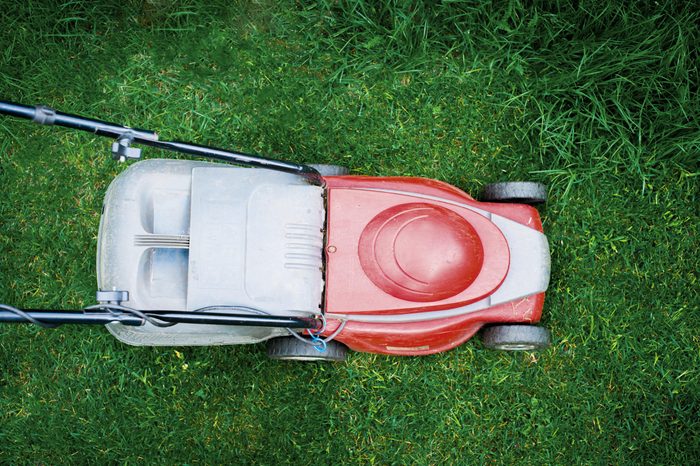
Caring for lawns and hearts
When Randa Ragland saw the note on her front door, calling her yard an “eyesore” and telling her she needed to “do better,” her heart sank. Her husband had just lost his job and she’d been busy caring for their toddler who’d just been diagnosed with stage four cancer—who could think about lawn mowing or weeding at a time like this? So she posted the note online and despite the cruel words in the letter she decided to respond with kindness, simply asking her neighbors for forgiveness and patience with the struggling family. She got so much more. Within hours her Pinson, Alabama, neighbors showed up with lawnmowers, rakes, and garbage bags and went to work—showing what it really means to be a good neighbor. Soon her yard looked pristine. But they didn’t stop there, with neighbors and local businesses offering services, donations, and raising money to help the family. “I’m in amazement. I’m still in shock,” she told CBS42. “I don’t have a large family. My mom is gone, my dad is gone, my brother is gone, so this means a lot.” This almost sounds like a good neighbor lesson straight out of Mr. Rogers.
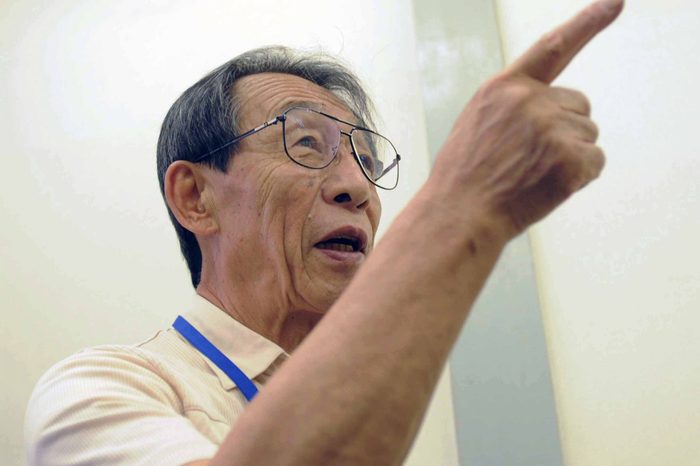
Giving up their lives for their younger neighbors
What more powerful way is there to serve your neighbor than to be willing to die for them? In an extreme act of unselfishness, a group of Japanese retirees showed how powerful and lifesaving caring for neighbors can be. Due to damage a tsunami caused to the Fukushima nuclear plant, the plant was spewing harmful radiation into the community. It created a terrible catch-22 as the longer it went on the more people were at risk yet the radiation was so high that anyone who went in to clean it would be at risk of death. Yasuteru Yamada, a 72-year-old retired engineer, decided that the only way to save his neighbors would be to sacrifice himself. He organized the Skilled Veterans Corps, a group of retirees over 60, to go in and stabilize the plant. “It isn’t brave, it’s practical,” he told the BBC. “Even if I were exposed to radiation, cancer could take 20 or 30 years or longer to develop. Therefore us older ones have less chance of getting cancer.”
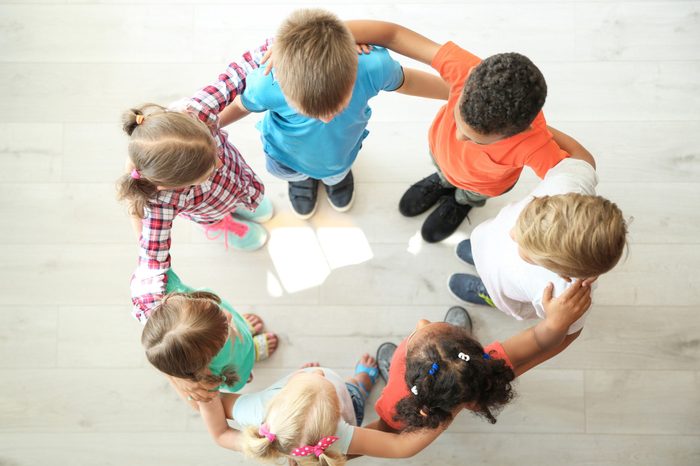
Everyone needs a friend
Kids can be the best kind of neighbors, as shown by 6-year-old Blake Rajahn. For his big first day of school his mother, Nikki, offered to make him a t-shirt with anything on it he liked. She assumed it would have something to do with basketball, football, or some other sport but his request surprised her. After thinking on it, Blake asked her for a shirt that said, “I will be your friend.” He explained it is “for all the kids who need a friend to know that I am here for them.” While most kids are worried about themselves feeling lonely at school, Blake was thinking of his neighbors. We have no doubt the t-shirt, and his friendly grin, helped a lot of first-graders! “Never underestimate your kid’s heart for others!” his mom wrote on Facebook.
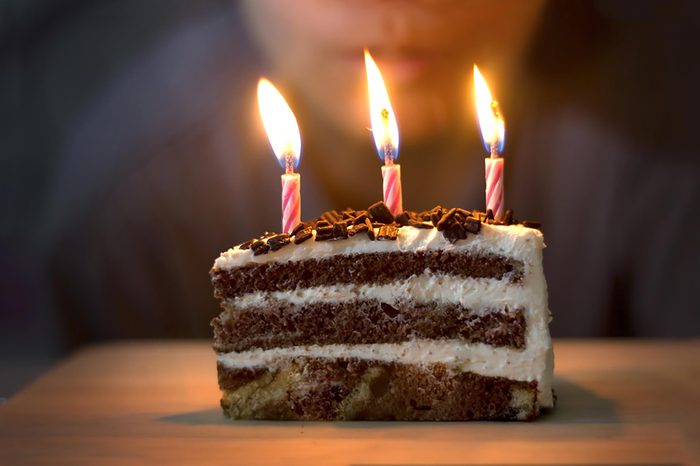
Best birthday ever
Angie Tyma had called her house in Hudson, Florida, “home” for 35 years. When her husband died about 20 years ago, a family friend bought the house and rented it back to Tyma. Little did she know, though, that her friend would eventually run into money problems and stop paying the mortgage. The lender foreclosed the property, and the house was sold, leaving Tyma without a home. Her neighbor from a few doors down, Danielle Calder, couldn’t stand the thought of Tyma and her two dogs living in a hotel room, so she put down $167,500 to buy the house back. Tyma moved back in on her 89th birthday and now pays rent to Calder. “It was the right thing to do,” Calder says to TODAY. “We’re family—the whole neighborhood.” Don’t miss these other heartwarming true stories.
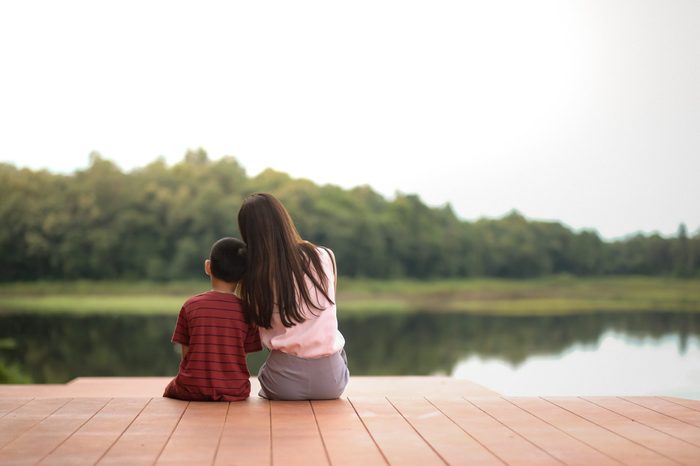
Mother figure
Kalon Smith had been in foster care since age two until a judge sent him back to live with his mom when he was 17. When his mom kicked him out of the house, he spent winter nights sleeping in a park while trying to finish high school. Smith had no bed, no documents, no shower—and no food. He went back to his old neighborhood and knocked on the door of Brook Welton, hoping to get something to eat. But she didn’t just give him a meal and send him on his way. She took him into her home, where he had warm food and a roof over his head. She also set him up with the church down the street, which helped him find a job and apply for a social security card. “Brooke has been my backbone. She’s my mother figure now,” Smith tells WFAA. These 21 people reveal the random acts of kindness that changed their lives.
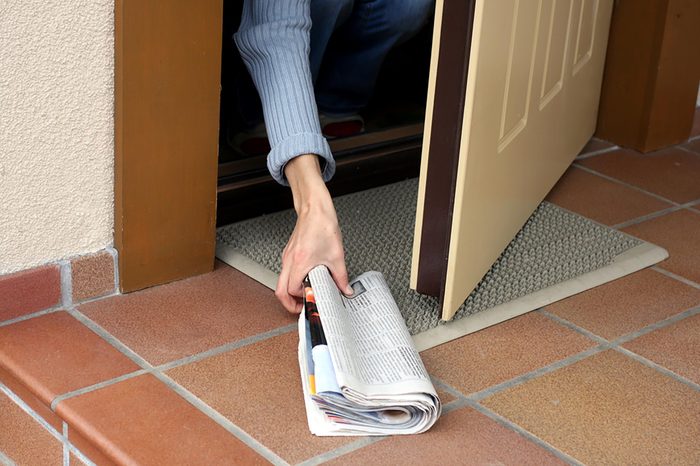
Suspicious newspaper
John Connelly had always been kind to his next-door neighbor. He would shovel snow and melt ice for the elderly woman, and even carry her newspaper from the sidewalk to her doorstep so she didn’t need to walk so far. Still, he never expected his good deeds would save a life. One winter, he realized she hadn’t been taking the newspapers from her doorstep. Thinking it was odd, he knocked on her door. No answer. Connelly called the police, who discovered the woman had fallen and couldn’t get up. They guessed she’d been there for about three days, disoriented and dehydrated, but she reached a stable condition at the hospital. “Who knows what may have happened if it had been even another day or so?” Connelly tells KSHB.
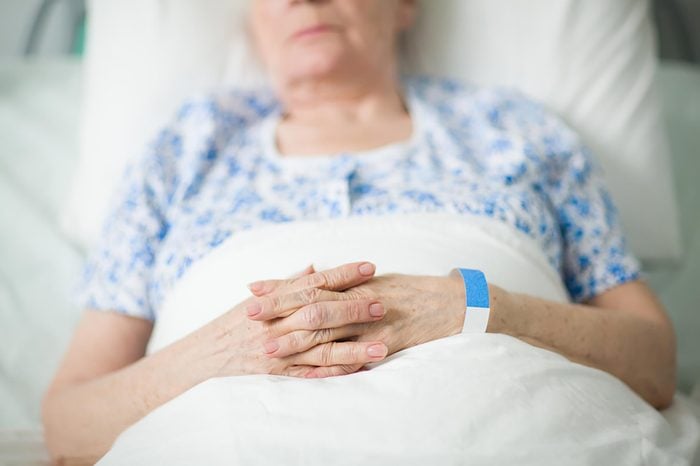
New roommate
Norma Cook, 89, and Chris Salvatore, 31, became friends living across from each other in a West Hollywood apartment complex. After Cook spent two months in the hospital with pneumonia and breathing problems on top of leukemia, though, doctors said she couldn’t move back without 24-hour care. Her insurance wouldn’t cover it, so Salvatore stepped in. He raised more than $77,000 on a GoFundMe page to cover the costs, but the expenses quickly sucked that money up. Cook doesn’t have children, and Salvatore didn’t want her moving into a facility, so he asked if she wanted to move in with him. She stayed there for about a month, until passing away in his apartment. “The last thing she did was put her arm around my neck —she was so weak, I don’t know how she did it—and pulled me in and kissed me and said, ‘I love you,’” Salvatore tells People.
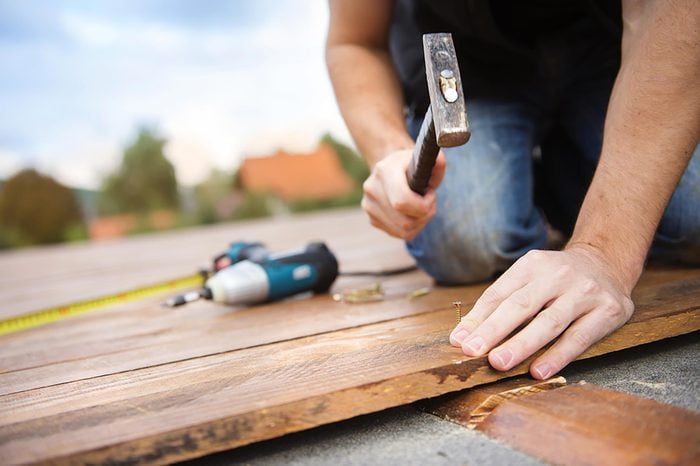
Fixer uppers
One house in a Hamilton Township, New Jersey, neighborhood was a bit of an eyesore. Anne Glancey, a retired teacher, had grown up in the house but blew off her neighbors’ offers to help her fix it up. Then, Glancey received a letter saying her home had code violations that could cost her up to $3,000 per day. She didn’t have money for the repairs or family and friends to lend a hand—except the couple next door. At a loss, she told Adam and Kristin Polhemus, who immediately offered to help. They recruited friends, neighbors, and members of their church to help out, with up to 25 people working at a time. Over the next several weekends, the group painted the house, landscaped the yard, and donated the car. Glancey served homemade orange juice and carrot cake to the workers, making friends in the process. “I think the biggest thing is Anne’s happiness and her kind of restored life,” Adam tells People. “Her outgoingness to other neighbors is based on her house being improved.” Her property violations are now erased. Find out the 39 random acts of kindness that don’t cost a cent.
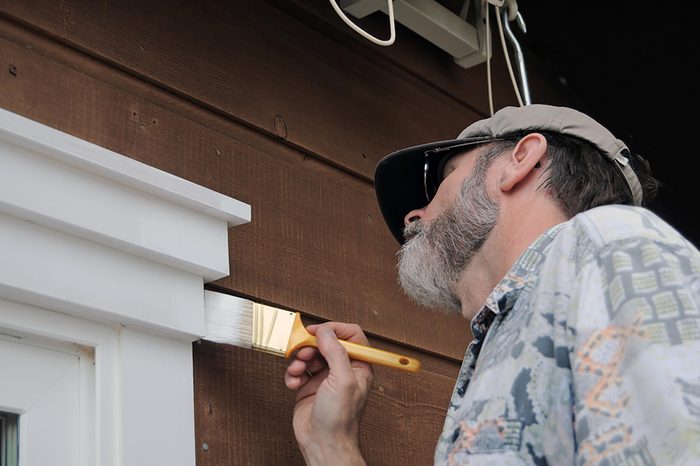
Home improvement
Code violation threats aren’t the only thing to spark a home makeover. Josh Cyganik overheard some teenagers insulting his neighbor’s house within earshot of the owner, Leonard Bullock, who was 75 at the time. The teens said, “Look at this crappy house—they just need to burn it down,” Cyganik tells TODAY. Bullock looked upset, so Cyganik decided to fight the insults with kindness. He turned to Facebook, rallying up hundreds of volunteers to repaint the house, with Bullock’s permission. Volunteers traveled from as far as Texas to the Pendleton, Oregon, home, transforming it to something Bullock could be proud of. Next, read these good news stories from recent times that you may’ve missed.

Home delivery
Jordan Walker was outside her El Cajon, California, apartment when a neighbor approached her in a panic, according to FOX 5. The woman asked Walker to call 911 because her daughter was having a baby. Walker’s boyfriend made the call while she followed the mother upstairs, where the daughter was in labor. The baby was already half out, so Walker, a medical assistant who had never helped with baby deliveries or pediatrics, climbed in the tub and guided her through pushing. The baby was blue in the face and wasn’t breathing. Walker realized the umbilical cord was wrapped around his neck three times, so she removed it and held the baby upside down until he started making noise. Paramedics took the mom and son to the hospital, and Walker calls little Ezekiel her miracle baby.
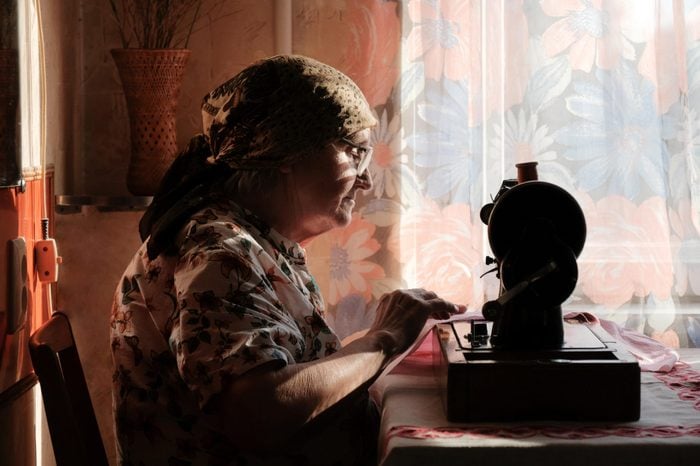
Grandma’s new coat
“My grandma Vera Kramer was the best grandma a girl could have. She was kind, caring, thoughtful and never said a bad word about anyone. She always found good in a person.
When I was young, Grandma worked hard all spring and summer to buy a new coat for the winter. She sold eggs, berries, and anything her garden produced to earn enough money.
Her old coat had seen better days, and she had patched it quite a few times.
When she finally had enough money saved up, off to town we went. Grandma looked so pretty in her new coat, and I was proud of the hard work she did to earn it.
That winter, in the small town of Harwood, Missouri, where she lived, a family with three small girls lost their house in a fire. They needed clothes, food and household items.
Grandma decided to cut up her new coat and make three coats for the little girls. I pleaded with her not to do it, but she kissed away my tears. She told me those girls needed coats much more than she did.
When they were done, we loaded up the red wagon with the coats, an apron for the mother, blankets, food, and three little dolls. I had watched Grandma make the dolls, coats, and apron on her old treadle sewing machine. When the family saw what was in the wagon, the mother started crying and the girls hugged the dolls.
On Sunday, Grandma wore her old coat to church and she was the prettiest grandma there. She was my best friend and second mom, and I dearly miss her.” -Brenda Lovewell, El Dorado Springs, Missouri, Country Magazine

Get well gift
During the summer of 1958, I was recovering from a broken pelvis that I had suffered in a car accident. My sister, Shirley, was recovering from rheumatic fever at the same time. Our rural mail carrier, Emil Salberg, grew lovely gladiolas in his garden. One day, he left a note saying we should meet him at the mailbox, which was about two miles from our farm. Emil delivered to Shirley and me the most beautiful bouquet of white gladiolas. It was the kindest and most heartwarming gesture that anyone could have done for two young farm girls who were feeling very low. We were so thankful for his generosity, and we will never forget him. -Ardella Score, Minot, North Dakota, Country Extra Magazine. Don’t miss these 24 stories about the kindness of strangers that’ll make you tear up.
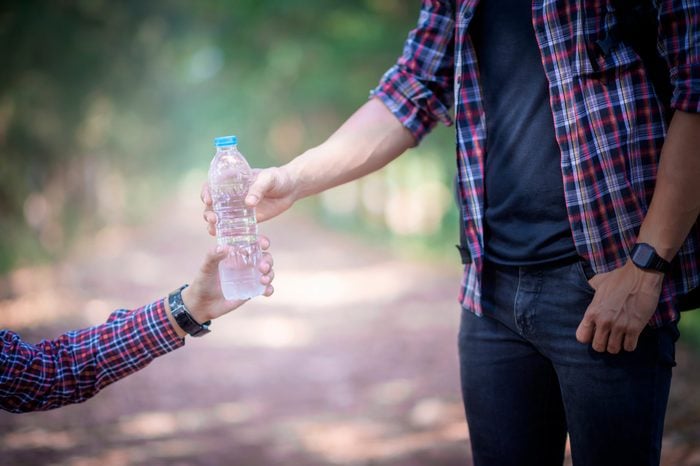
Refreshing act
A few years ago, on one of the hottest days of the year, I was pulling into my driveway when I saw a man mowing and trimming the grass at the bank next door. I didn’t know him, but I decided he needed a cold drink.
I went into the house and grabbed a Gatorade from my fridge and went back outside. Then I stood on my sidewalk where he could see me when he turned the mower around. I held up the drink and pointed to him. He nodded. When he came over to accept the bottle from me, he thanked me profusely and said he was thinking about going to the nearby gas station to get something to drink.
Ever since that day, he has done favors for me. He trims the grass around my sidewalk, assembles lawn furniture, installed a 20-foot flagpole and gives me advice whenever I need help. He will not take any pay. He just shakes my hand and gives me a hug. I’ve been repaid in kindness so many times. -Agnes White Hoffman, Illinois, Country Extra Magazine
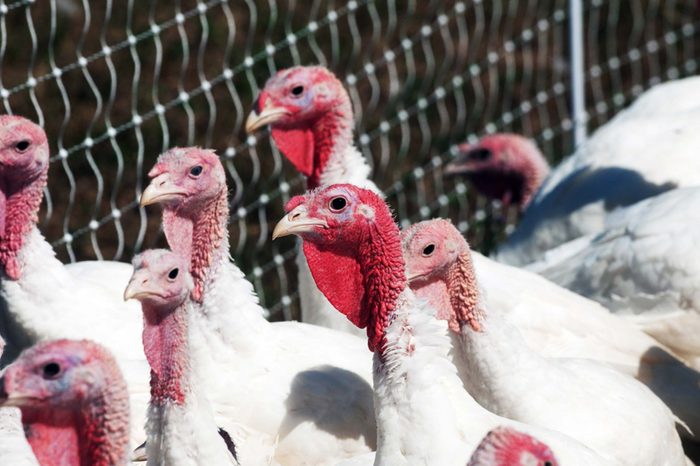
Flocking to the Fowlers
The early winter storm was much worse than the forecast. In the 1950s, the weather was frequently a best-guess science.
“Sweetheart,” Dad whispered to Mom, “I’ve got to get out of bed and go check on the turkeys.” When Dad left the house, Mom worried that he would not be able to make it to the farm. The snow was whipping around the little white frame house at 40 miles per hour, and there were deep drifts on the driveway.
At 7 a.m., Mom was ready to call for help when Dad’s truck slid into the driveway. He nearly collapsed on the kitchen floor. “Call Bishop Gurney,” he stammered. “Have him tell the congregation to come up to the farm and get a free turkey for Christmas dinner.
“Near as I can tell, we have 500 frozen birds,” he said, shaking his head in defeat. “Give me a minute to get warm and cleaned up.” With seven children to feed, he knew the loss would be financially devastating.
That morning Bishop Gurney relayed the tragic story. Then he called other local bishops and urged them to tell friends and neighbors where they could get a turkey.
As the sun burst forth, hundreds of cars drove up the snowy road to the Fowler farm. Every turkey was claimed. Friends viewed the tragic scene in sympathy. But the mood changed as more people arrived.
Nearly all of the birds, which still had to be cleaned and plucked, were paid for in cash. With the realization that the tragedy was being salvaged, neighbors talked and even laughed. Someone placed a donation can on the hood of Dad’s truck. Often more was proffered than what the birds would have cost at the store.
Mom and Dad humbly thanked the Lord as they counted hundreds of dollars and hundreds of friends. -Bill Fowler, St. George, Utah, Country Extra Magazine
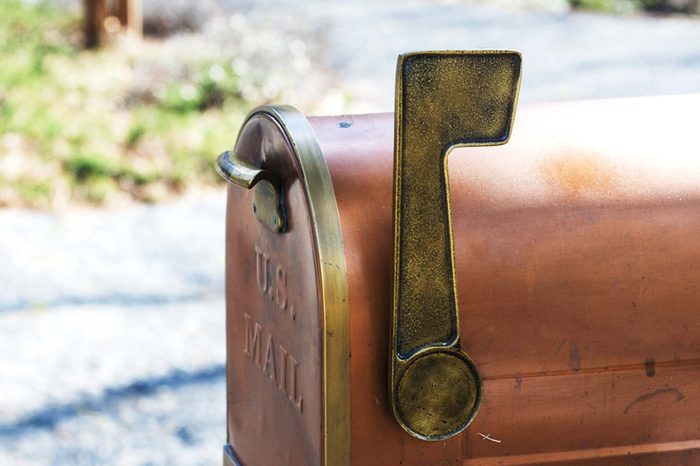
Lost and found
In September 2002 my husband, Jay, and I took a trip to Alaska. During our adventures, we stayed at a bed-and-breakfast in the middle of nowhere. The 80-year-old owner quickly endeared himself to us with his many stories. We knew we would never forget our new friend, Boots.
After our trip we started corresponding with him, mostly just Christmas cards and a letter here and there. Boots wrote us when he moved from Alaska to Nevada to be closer to relatives due to his age and health.
One year we got no Christmas card. We wrote to him immediately and received neither a reply nor a “Return to Sender” notice. We assumed that Boots was just not capable of writing back. So for several years, we would occasionally send him a letter.
On Jan. 29, 2012, we received a “Return to Sender” notice that was postmarked Feb. 6, 2006! The envelope looked like it had been through a war zone. The post office had written, “P.O. Box closed. No forward,” on the envelope. Now our curiosity and concern were in high gear.
I knew the town where Boots lived was very small. Maybe the post office workers would remember him, so I decided to call. They were nice, and after searching they found a forwarding address in Colorado.
Our daughter, Sarah, suggested that we write a letter explaining the situation. Sure enough, a few days later we got a phone call from Boots’ daughter-in-law, who told us he was living with her and her husband in an apartment attached to their house.
I had a delightful visit with her, and then she let me talk with Boots. He was slightly hard of hearing but quick-witted, and he remembered us. We’re so happy to be reconnected. -Lisa Forseth, Columbus, Montana, Country Extra Magazine.
